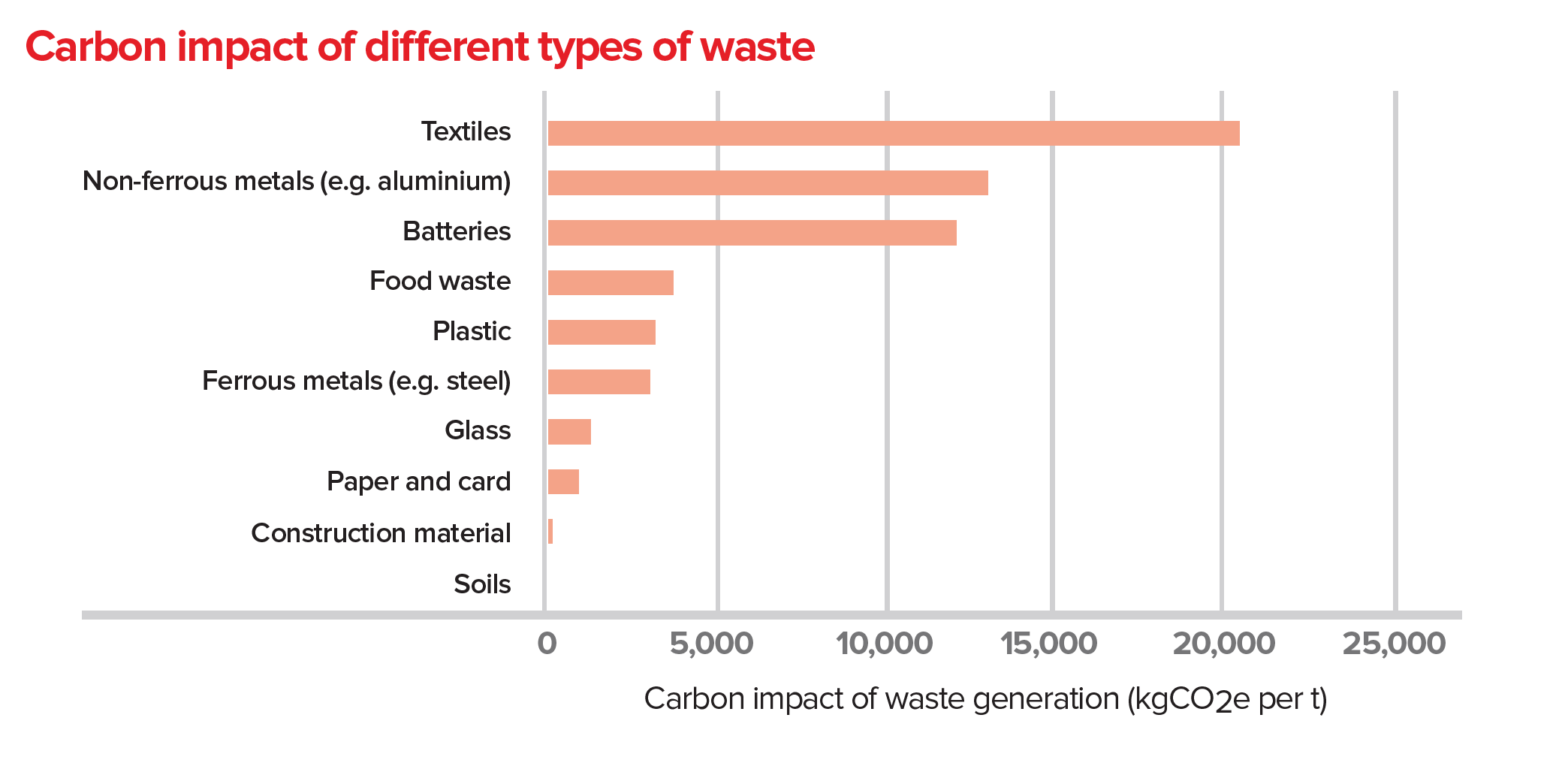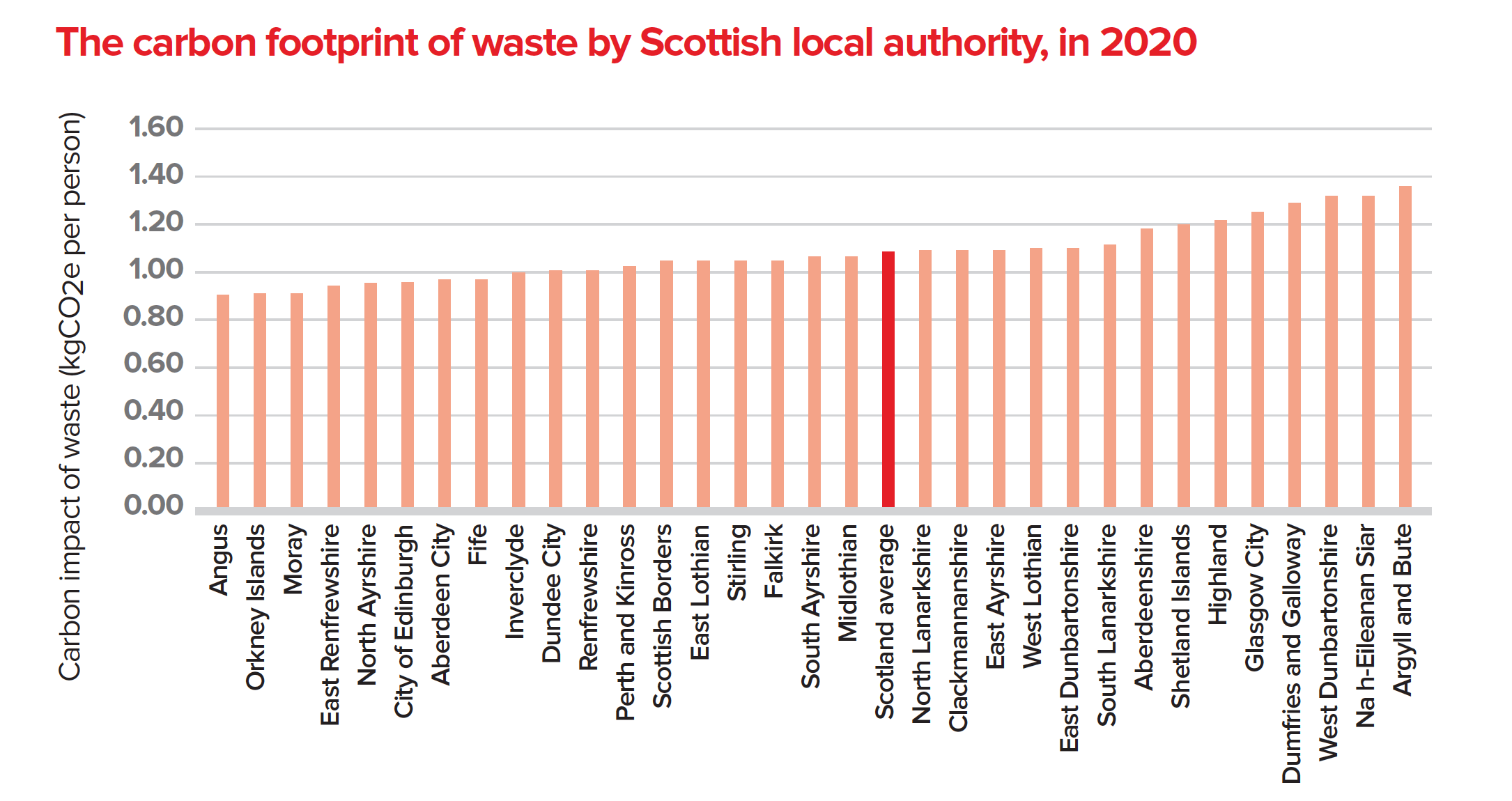
How can councils tackle the carbon impact of waste?
Scotland, like many countries, measures its progress on waste with weight-based targets. This means all of Scotland’s waste is weighed and these measurements are used to calculate our recycling and landfill rates.
However, there is a problem with this approach – the easiest way for a council or business to increase its recycling rate is to concentrate on the heaviest materials, like bricks, concrete and soil. Lighter materials, such as textiles and plastics, can be overlooked even though they are more significant in environmental terms (see graph). If we want our waste systems to be more sustainable, a carbon-based target would be a better approach.
Carbon impact of different types of waste

(From ZWS 2022)
Where Scotland differs to other countries is that it has already pioneered a carbon-based measurement for waste which does exactly this. Since 2011, Zero Waste Scotland has calculated the carbon impact of Scotland’s waste using the Carbon Metric.
This tool measures the whole-life carbon impacts of waste, from resource extraction and manufacturing emissions, right through to waste management emissions, regardless of where in the world these impacts occur.
It is important to consider emissions across the whole life of materials, not just those which occur in Scotland, because about 50% of our goods and services are imported. The greatest benefit of recycling often comes from reducing the demand for resource extraction to make new products. By measuring and understanding the whole life carbon impacts of materials, the Carbon Metric allows decision makers to make more informed choices about how to reduce these impacts, wherever they occur.
Scotland’s Carbon Metric shows that the carbon in our household waste is concentrated in just three key materials. Food waste, textiles and plastics hold 74% of the carbon impact of Scottish household waste. By weight, these wastes make up only 31% of household waste. So Scotland could dramatically cut the carbon emissions of our waste by concentrating recycling and prevention efforts more on these three materials.
The current situation shows we are not doing enough. The latest Carbon Metric report from Zero Waste Scotland showed that in 2020, there was an increase in the amount of household food, textiles and plastics waste being generated and sent to incineration. The total carbon emissions from household waste rose 3.2% from 2019 to 2020 – up to 5.8 million tonnes of greenhouse gases.
Councils are in charge of designing and providing waste collection systems for households and therefore have a key role to play in reducing the carbon impact of household waste.
The graph below shows there are considerable differences in the carbon footprint of waste between councils when we look at the figures per person.
If every council performed as well as the best performing council, Angus, over a million tonnes of greenhouse gases would be saved. But all local authorities can, and must, go even further.
The carbon footprint of waste by Scottish local authority, in 2020

(From SEPA 2022)
In 2021, the Scottish Government created a £70m recycling improvement fund to transform Scotland’s recycling infrastructure. Around £20m has been awarded to 16 projects across various councils already. These have included projects to redesign collection systems and efficiency improvements for bin lorries. Future change should be focused on those projects and materials which are most likely to reduce the carbon impact of waste.
The decisions made today will affect whether we reach our climate goals in the future. For those involved in decision making on waste and recycling, the way forwards is clear: councils, businesses and waste management organisations, should be encouraged to focus on food, textile and plastic waste through funding opportunities, like the Scottish Government’s improvement funds.
Recycling food waste should be the default disposal option for all households and businesses. Separate collections of textiles for households would increase recycling of this waste stream. Scotland has already committed to a deposit return scheme for bottles which should increase plastic recycling dramatically – similar solutions, which focus on increasing producer responsibility, are needed for other plastic waste items.
At Friends of the Earth Scotland, we will continue to push towards these goals as an important part of creating a circular economy in Scotland.
